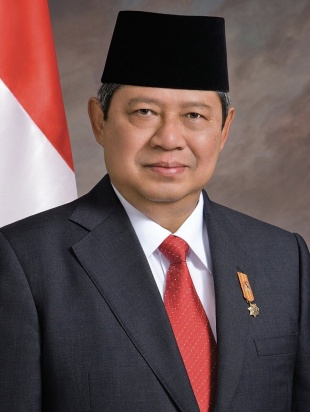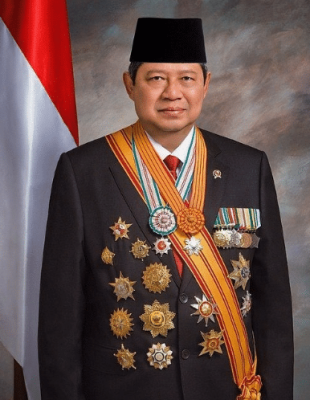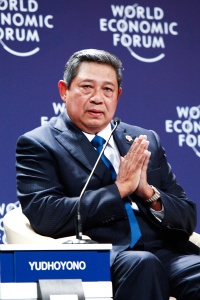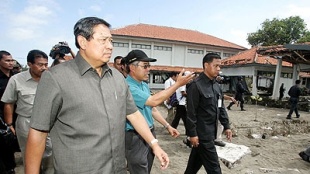INDONESIA UNDER YUDHOYONO
Yudhoyono was formally sworn in as president in October 2004 and served two five-year terms, relinquishing his position in 2014. He appointed several military men to his cabinet. His vice president, Jusuf Kalla, was a non-Javanese and a wealthy businessman. Yudhoyono ran on the platform "more just, more peaceful, more prosperous, and more democratic Indonesia." Among his cabinet appointees were Finance Minister Sri Mulyani Indrawati and Trade Minister Mari Pangetsu — considered two of Asia's most powerful women.
Under Yudhoyono, reforms gained cautious momentum. Indonesia developed a freer press, judicial reform began to take hold, and anti-corruption bodies succeeded in prosecuting powerful figures in ways previously unimaginable. Yet SBY inherited a deeply indebted nation, lingering separatist movements, and the growing threat of Islamist terrorism. He also faced public expectations of firm leadership, even as Suharto-era elites continued to dominate major sectors of business and finance. Rebuilding Indonesia into a more equitable and stable society remained an immense challenge—one requiring political resolve, institutional reform, and, as Indonesians have long believed, perhaps even assistance from the supernatural. [Source: “Culture and Customs of Indonesia” by Jill Forshee, Greenwood Press, 2006]
A key reform signal came with the appointment of Abdul Rahman Saleh, a well-regarded Supreme Court judge, as attorney general. Saleh had previously led an internal judicial anti-corruption drive praised by civil society groups. Throughout the campaign, Yudhoyono portrayed himself not as a bold reformer but as a steady, thoughtful leader committed to unity. He emphasized resolving separatist conflicts and branded his cabinet the “United Indonesia Cabinet.” After his victory, he repeatedly sought reconciliation with outgoing president Megawati Sukarnoputri, who refused to acknowledge defeat or engage with him. [Source: The Economist]
Ultimately, while Yudhoyono was widely credited with bringing political stability, critics argued that his near-decade in power was marked by hesitation and policy inconsistency, as well as a failure to make deeper inroads into poverty reduction and rising religious intolerance. Economic growth averaged about 5.8 percent during his tenure—strong by global standards but still below Indonesia’s perceived potential and heavily dependent on volatile commodity prices. Under his sterwardship, Indonesia had one of the fastest-growing economies in Asia, along with China and India. But that same economy, which achieved annual growth rates of more than 6 percent from 2010 to 2012, mostly thanks to the country’s abundant natural resources and robust domestic consumption, is facing several serious challenges. They include a trade deficit, a national fuel subsidy that sucks tens of billions of dollars each year from the state budget, inadequate infrastructure, corruption, poverty and a growing disparity between the country’s rich and poor. [Source: Joe Cochrane, New York Times, July 22, 2014; Jonathan Thatcher, Reuters, March 15, 2014]
RELATED ARTICLES:
SUSILO BAMBANG YUDHOYONO (PRESIDENT OF INDONESIA 2004-2014): LIFE, CAREER, INTERESTS factsanddetails.com
REFORMASI AND THE POST–SUHARTO ERA factsanddetails.com
MEGAWATI SUKARNOPURTI (PRESIDENT OF INDONESIA 2001-2004): LIFE, POLITICAL CAREER, FAILURES factsanddetails.com
SUHARTO: HIS LIFE, PERSONALITY AND RISE TO POWER factsanddetails.com
INDONESIA UNDER SUHARTO: NEW ORDER, DEVELOPMENT, FOREIGN POLICY factsanddetails.com
REPRESSION UNDER SUHARTO factsanddetails.com
VIOLENT CRACKDOWN ON COMMUNISTS IN INDONESIA IN 1965-66: KILLERS, VICTIMS, REASONS factsanddetails.com
OUSTER OF SUHARTO IN 1998: PRESSURES, EVENTS, RESIGNATION factsanddetails.com
INDONESIAN ELECTIONS IN 2004 AND 2009 factsanddetails.com
2014 ELECTION IN INDONESIA: ROCK STARS, RALLIES AND SMEAR CAMPAIGNS factsanddetails.com
JOKO WIDODO: HIS LIFE. CAREER, FAMILY, INTERESTS AND RISE TO POWER factsanddetails.com
JOKO WIDODO AS PRESIDENT: HIS FOLKSY STYLE, ACHIEVEMENTS AND CRITICS factsanddetails.com
2024 ELECTIONS IN INDONESIA factsanddetails.com
Yudhoyono Takes Power
Yudhoyono was sworn in as Indonesia’s sixth president after winning the country’s first direct presidential election in 2004. At 55, he began his five-year term amid high expectations that he could confront the problems burdening the world’s most populous Muslim nation, including rising Islamic militancy, entrenched corruption, and widespread poverty. During the inauguration, Yudhoyono pledged before parliament to uphold the constitution and serve the nation, as an Islamic cleric held the Koran above his head. Source: Associated Press, Reuters, October 20, 2004; The Economist]
Yudhoyono campaigned on promises to champion ordinary Indonesians, crack down on corruption among the political elite, combat terrorism, and revive an economy struggling to absorb a rapidly growing workforce. In the weeks between his election and inauguration, he invited thousands of supporters to his home outside Jakarta, informally discussing national issues with visitors from across the archipelago. Yet he entered office facing a hostile parliament dominated by entrenched elites. Analysts warned that his political honeymoon would be brief unless he moved quickly on reform and security to restore foreign investor confidence. Some observers described him as cautious and nonconfrontational, noting that despite his military background, he did not fit the mold of a traditional Indonesian general.
The Economist reported that Yudhoyono’s month-long transition offered few clues about his governing instincts. He consulted a wide and sometimes contradictory group of advisers, while issuing public statements that were deliberately vague. His cabinet included four former generals, unsettling critics wary of authoritarian tendencies, though the economic team appeared equally mixed. Aburizal Bakrie, a prominent businessman whose conglomerate had accumulated heavy debts during the Asian financial crisis, was named coordinating minister. At the same time, Yudhoyono appointed internationally respected technocrats, including a former Asian Development Bank official as finance minister and a senior IMF figure to oversee national planning.
Yudhoyono as President
Yudhoyono was generally hailed as a reformer. He promised to be a strong leader and take firm action to fight terrorism and get the economy on course. He also vowed to crackdown on corruption, reduce poverty, improve the economy, end separatist conflicts in Aceh and Irian Jaya, and reform the military. If anybody could reform the military he argued it would be him because he was still respected in the military. His Democratic Party was relatively small. It came in forth in the 2004 general elections with 7.5 percent of the vote and 57 seats in the 550-seat legislature.
Yudhoyono was credited with raising Indonesia’s profile abroad and praised for leading Indonesia through a period of extended political stability, consolidated democratisation and economic growth. AFP reported: “Highlights of his first term included a peace deal with Acehnese separatists which ended a bitter 30-year conflict, multiple high-profile arrests of corrupt officials and steady economic growth despite the global financial crisis. But he also came under fire from civil society groups for caving in to calls from hardline Islamists for restrictions on the minority Ahmadiyah sect, and for backing a sweeping anti-pornography law despite broad opposition.”
Yudhoyono was widely recognized for advancing military reform, promoting regional autonomy, and seeking negotiated solutions to long-running separatist conflicts in Aceh and Papua. He was also credited with helping revive Indonesia’s economy through a market-oriented reform agenda and with supporting anti-corruption efforts by working closely with the Corruption Eradication Commission (KPK). Under his leadership, Indonesia experienced a period of improved political and economic stability, which observers often attributed to his personal authority and influence. His first year in office presented an extraordinary test with the 2004 Asian tsunami, and his government later earned international praise for brokering a landmark peace agreement with Acehnese separatists in 2005. [Source: BBC, April 8, 2014]
At the same time many of Indonesia’s structural problems persisted under Yudhoyono. Corruption remained widespread, terrorism continued to pose a threat, and although the military no longer held guaranteed seats in government, it retained significant influence over society. Political reforms expanded some freedoms, but activism and dissent could still be dangerous, as highlighted by the 2005 poisoning of prominent human rights advocate Munir aboard a Garuda flight. Yudhoyono did, however, gain public approval by ensuring that foreign aid reached tsunami-stricken regions, including Aceh, which was still under martial law, and by reviving peace talks with Acehnese rebels. Whether these initiatives would produce lasting change, observers cautioned, remained uncertain. [Source: Lonely Planet]
Yudhoyono and the 2004 Tsunami
Yudhoyono’s early months in power were dominated the tsunami disaster and after that he helped hammer out a peace deal in tsunami-struck Aceh. The Yudhoyono administration was able, with international assistance, to cope reasonably competently and transparently with the December 2004 tsunami, thought to be the most destructive ever recorded and responsible in Indonesia alone for at least 166,561 deaths and 203,817 displaced persons, mostly in Aceh, as well as untold devastation. A combination of skill and goodwill also made it possible for Jakarta to turn the catastrophe to some good account by negotiating a peace settlement with GAM the next year. [Source: Library of Congress]
Alan Sipress wrote in the Washington Post, “When the tsunami crashed into Indonesia's westernmost province of Aceh in December, President Susilo Bambang Yudhoyono was nearly 3,000 miles away at the far end of the archipelago. It took him more than a day to reach the scene of the disaster, but that was a sprint by the standards of Indonesia's traditionally lumbering leadership. He has returned to Aceh four more times, winning widespread applause from ordinary Indonesians for his high-profile presence in the devastated region. [Source: Alan Sipress, Washington Post, February 27, 2005]
Indonesian political analysts and commentators said, however, it was not enough to turn up at the scene. Yudhoyono appeared to be too stiff and proper, dressed for a meeting rather than a rescue mission, many analysts said. During his trips, the president wore a formal shirt with long sleeves neatly buttoned at the wrist instead of rolling his sleeves up and wading into the wreckage. Critics fault Yudhoyono for missing a golden chance to energize his young administration, which took over in October, and rally a nation that has grown cynical about politics in recent years. Moreover, they blame the president for failing to provide clear direction for recovery efforts in Aceh, where at least 120,000 people were killed by the tsunami and many more left homeless. "He should have used much more urgent rhetoric to drive home the message of national emergency," said Dewi Fortuna Anwar, a political commentator with the Habibie Center, a private think tank. "It was characteristic of Bambang Yudhoyono. He was good, but he could have gone the extra mile." [Source: Alan Sipress, Washington Post, February 27, 2005 /]
“Faced with a natural disaster unparalleled in the country's modern history, Yudhoyono fell short in marshaling Indonesia's resources, she said. For instance, he deferred to military commanders when they resisted the emergency deployment of two army battalions to the province to help in relief efforts. Then, after proposing the establishment last month of a special authority to oversee Aceh's reconstruction, Yudhoyono seemed to back away from the idea, creating confusion over who will orchestrate the massive effort. Two months after the disaster, critics say there remains little coordination among government ministries, private charities and international organizations. "Who's in charge? Who's going to be the conductor?" asked Humam Hamid, chairman of the Aceh Recovery Forum. "The president needs to be more decisive. People are waiting." /
“Hamid said, for instance, that Acehnese refugees living outside designated camps had yet to receive emergency food supplies because of confusion among government officials. And he said the central government had been slow to formalize its plan to establish coastal buffer zones. As a result, some refugees have already begun to rebuild destroyed homes in locations where the government may ultimately ban development. Presidential spokesman Andi Mallarangeng said: "The president, since day one, instructed that we do our best to see that all resources are mobilized and nothing be spared. We have done tremendously. Of course we could do better." /
On the plus side, The president also took advantage of the heightened international interest in Aceh to press forward with negotiations over a peace deal with the separatist Free Aceh Movement.
An earthquake off the coast of W Sumatra in September 2009, caused significant destruction and more than a thousand deaths in Padang and the surrounding area.
Yudhoyono, Pancasila and the Indonesian People
In 2006 President Yudhoyono made a point of giving a major national speech on the then-neglected Birth of Pancasila Day (June 1), recommending that politicized niggling over the historical origins and other details surrounding the Pancasila—which he described as the “state ideology”—cease and that greater attention be paid to its precepts. There were numerous calls for making June 1 a national holiday, and the minister of education said that the Pancasila would remain part of the curriculum. It looked very much as if a key element of the New Order was about to be reinstated. *
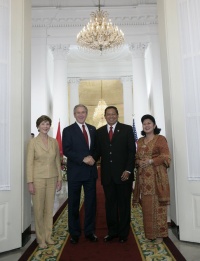
The president made a special effort, however, to emphasize that he did not intend to return to the past. The authoritarian Suharto government had, he said, “twisted the ideology to promote conformity and stifle dissent” with what he termed “Pancasila brainwashing,” which caused the populace to turn against it and its sponsors. But in reality, he said, the Pancasila is “not an absolute doctrine but a compromise reached by the nation’s founding fathers,” and it should be accepted as such, not as a sacred document used to enforce uniformity. It is a compromise that sees all Indonesians as equal and protects pluralism and tolerance; it supports democratic reform and human rights, at the same time as it promotes a sense of unity under a common sense of social justice. This is precisely what is needed, Yudhoyono argued, at a time when rapid political decentralization and vigorously competing ethnic and religious identities threaten national unity. Whatever the degrees of public trust in Yudhoyono’s message, it will, of course, be some time before it is clear where it will lead. Nevertheless, making the effort to see elements of change where continuity is most apparent at least brings observers closer to the realization that an easy, either/or reading is inadequate. *
On March 2006, women’s groups protested in Jakarta against a proposed “pornography bill” imposing strict Islamic dress codes and conduct rules on women but not men, urging the government to prioritize issues such as domestic violence and human trafficking. In April 2006, 5,000 trade unionists in Jakarta and Surabaya protested government favoritism toward business interests.
Yudhoyono made various efforts to reach the Indonesian people directly. Some of his ideas may have been a little unrealistic. John Aglionby wrote in The Guardian, If Yudhoyono “thought he could get closer to his people by giving out his mobile phone number and inviting complaints, then he seriously miscalculated the scale of the nation's discontent. "If you think [we] don't care, never come to you and your problems are left unsettled, my cellular phone is active 24 hours a day," he was quoted yesterday as saying at a small gathering of farmers on Saturday afternoon.
But as soon as Mr Yudhoyono gave out his number — +62 811 109 949 for those outside Indonesia — the media started broadcasting it nationwide. Within minutes the presidential mobile was inundated with calls and text messages, and by yesterday morning the flood of complaints had become so great that the service was overwhelmed. "We're now looking at a system which can accommodate more messages," said a presidential spokesman. "If we change the number of course we will announce it." Callers to one radio chat show welcomed the president's initiative but suggested it might be easier if he had an email address as well. [Source: John Aglionby, The Guardian, June 13, 2005]
Yudhoyono and Terrorism
The Yudhoyono government proved itself unexpectedly determined and adept in bringing to justice those responsible for various terrorist activities. In November 2008, it proceeded with the execution of the three men responsible for the 2002 Bali bombings, who had been held since their capture and conviction in 2003. [Source: Library of Congress]
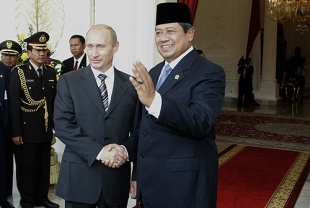
According to the Muslim 500: Yudhoyono’s popularity was “due in part to the sincerity with which he actualises his promises to the Indonesian people such as the promises for anti-terrorism enforcement made during his 2004 election campaign. Indonesia worked closely with Australian intelligence and security forces to quell extremist threats. In March, 2010, he was awarded the Honorary Companion of the Order of Australia (AC) by former Australian Prime Minister Kevin Rudd who said the award was in recognition of the Indonesian leader’s efforts in tracking down the people behind the October, 2002 Bali bomb attack. In response to the July 2009 hotel bombings in Jakarta, President Yudhoyono was vigilant about openly condemning the perpetrators as agents of terrorism and simultaneously voiced his dedication to establishing peace and security in Indonesia through programs that target education and poverty-alleviation in key areas where militants may prey on youths.
Eric Ellis wrote in The Times, “Yudhoyono told The Times of a course of “shock therapy” to fight terrorism and eradicate corruption. President Yudhoyono’s remarks on terror will hearten Western leaders frustrated at his predecessor Megawati Sukarnoputri’s half-hearted efforts to crack down on the JI. “The main issue is no longer whether there is or is not such a formal organisation called Jemaah Islamiyah. What is important is whoever performs the act of terrorism in Indonesia, JI or any other groups. “We will undertake all of our effort to prevent and fight against terrorism. We will take stern action. We will not give room for terrorists to develop and perform acts in Indonesia.” [Source: Eric Ellis, The Times, November 8, 2004]
Yudhoyono and Corruption
At the start of his presidency, Susilo Bambang Yudhoyono was widely praised at home and abroad for revitalizing Indonesia’s fight against corruption and strengthening the authority of the Corruption Eradication Commission (KPK). Soon after taking office in 2004, he promised “shock therapy” in his first 100 days, signaling that even senior and well-connected officials would face prosecution. This stance was reinforced by the arrest of Aceh governor Abdullah Puteh on corruption charges—one of the first major detentions in years—and by approval for investigations into other governors, legislators, and local officials. [Source: Matthew Moore, The Age, December 9, 2004; Patrick Guntensperger, Asia Times, July 2, 2009; AFP, April 8, 2009; Thomaswhite.com; Columbia Encyclopedia, 6th ed., Columbia University Press]
Throughout his tenure, Yudhoyono publicly supported the KPK’s independence and encouraged it to confront entrenched corruption. Under his leadership, the commission earned a reputation for effectiveness and integrity, posting an almost unbroken conviction record and prosecuting senior figures across government, including lawmakers, governors, mayors, diplomats, and top bureaucrats. By the 2009 election, his anti-corruption image was further bolstered when individuals linked to his own political circle, including a relative by marriage, were convicted, countering claims of selective enforcement. These high-profile cases enhanced both his domestic standing and his international reputation as a reform-minded leader in a system long affected by corruption.
Despite this record, Yudhoyono’s administration was repeatedly touched by scandal. In 2008, large protests erupted over allegations that he and close associates had benefited from a $710 million government bailout of a failing bank. Yudhoyono denied any involvement, and opinion polls suggested the claims had limited impact on his popularity, with only a small minority of Indonesians believing he was guilty.
In November 2009, his reformist image suffered another blow when senior law-enforcement officials were accused of trying to weaken the KPK by fabricating charges against two of its investigators. Critics argued that Yudhoyono’s reluctance to immediately dismiss those officials undermined his credibility. Further damage followed as corruption investigations increasingly ensnared members of his Democratic Party, including its chairman in 2013.
His anti-graft credentials were also tested during the 2009 election campaign by allegations of vote buying involving his youngest son, Edhie Baskoro Yudhoyono. Although electoral authorities investigated claims that cash had been distributed to voters at a campaign event, police ultimately cleared Baskoro of wrongdoing, and Democratic Party officials denied the accusations. Instead, investigators pursued a rival candidate and several journalists for allegedly spreading defamatory claims.
Taken together, these controversies complicated Yudhoyono’s reputation as a clean reformer, underscoring the enduring tension between his anti-corruption agenda and the political constraints of governing.
Economy Under Yudhoyono
During Susilo Bambang Yudhoyono’s decade in office from 2004 to 2014, Indonesia’s economy grew at an average annual rate of about 5.8 percent—strong by global standards and among the fastest in Asia, alongside China and India. Growth exceeded 6 percent between 2010 and 2012, driven largely by abundant natural resources and strong domestic consumption. At the same time, performance fell short of Indonesia’s perceived potential and remained vulnerable to fluctuating commodity prices. Structural problems persisted, including trade deficits, costly fuel subsidies, weak infrastructure, corruption, poverty, and widening income inequality. [Source: Joe Cochrane, New York Times, July 22, 2014; Jonathan Thatcher, Reuters, March 15, 2014; Thomaswhite.com; Library of Congress; Eric Ellis, The Times, November 8, 2004]
Yudhoyono was widely regarded as pro-business. His election in 2004 boosted investor confidence and sent stock markets higher. He pledged to sharply reduce unemployment by attracting foreign investment and rebuilding Indonesia’s banking sector, while encouraging greater participation from domestic and overseas investors, including the ethnic Chinese business community. Upon taking office, he emphasized economic recovery and job creation as central goals of his presidency.
The administration demonstrated a willingness to take politically sensitive decisions, notably by cutting gasoline and cooking fuel subsidies to stabilize the state budget—moves that did not trigger large-scale unrest. Strong domestic demand and limited reliance on exports helped insulate Indonesia from the 2008–2009 global financial crisis, while the stock market surged and growth remained positive. By 2009 and early 2010, Indonesia’s economic resilience drew international attention, with competitiveness rankings improving and growth rebounding above 6 percent.
Living standards improved during Yudhoyono’s presidency. Per-capita income rose sharply, poverty rates declined significantly, and income distribution compared favorably with several neighboring countries, even though overall GDP levels were lower. Foreign direct investment increased rapidly, the rupiah strengthened, and Indonesia’s sovereign credit rating was upgraded to just below investment grade by major agencies. Regional investment, particularly from ASEAN countries, expanded, and Indonesia emerged as a key manufacturing base in sectors such as footwear.
Despite these gains, challenges remained. A sizable share of the population continued to live below the poverty line, infrastructure lagged behind economic needs, and bureaucratic complexity discouraged investors. Acknowledging these disparities, Yudhoyono promoted a “growth with equity” strategy to balance expansion with social inclusion. While Indonesia’s economy showed a marked turnaround under his leadership, critics argued that deeper reforms were needed to sustain higher growth and ensure its benefits were more evenly shared.
Yudhoyono Foreign Policy
Yudhoyono was labeled Pro-American when it came to foreign policy. Paul Dillon of Aljazeera wrote: A career soldier, Yudhoyono and graduate of US military training programmes at Fort Benning, Columbus (1976 & 1982), and the Command and General Staff College at Fort Leavenworth, Texas (1991), Yudhoyono has fond memories of the US. "I love the United States, with all its faults. I consider it my second country," the International Herald Tribune quoted him as saying last year. [Source: Paul Dillon, Aljazeera, July 4, 2004]
Eric Ellis wrote in The Times, Yudhoyono “pledged to fix the often fractious relationship with Jakarta’s southern neighbour, Australia. In foreign embassies in Jakarta, he is regarded as the most Western-friendly leader in Indonesian history. He has already opened his doors to American magazines, Australian television, Japanese newspapers and The Times. [Source: Eric Ellis, The Times, November 8, 2004]
John Kurtz of the World Economic Forum wrote: Yudhoyono made “a long string of impressive public appearances at global conferences. His remarkable ability to exude both humility and strength, especially as he talked of preparing the country for many more years of growth, strikes a chord with investors and with his many regional friends.” [Source: John Kurtz, World Economic Forum, May 23, 2014]
Indonesia role within Southeast Asia was viewed as a means of generating economic growth. Addressing the disparity of income problem in Indonesia and developing world, Yudhoyono gave a special address entitled “The Big Shift and the Imperative of 21st Century Globalism,” delivered at the World Economic Forum in Davos, Switzerland, in January 2011. He called for a new sense of globalism that is “open-minded, pragmatic, adaptive and innovative,” a globalism in which regional groupings play a crucial role in supplying both dynamism and restraint. The world economy, he stated, should be managed “so that it functions to meet our needs rather than satisfying our greed,” and he repeated Indonesia’s own national goal of “growth with equity,” implying that the world community could well aim for something similar. Indonesia took up the chair of ASEAN in 2011, and it was clear on the eve of the organization’s annual meeting in late July 2011 that Indonesia would use that opportunity to emphasize the same themes and enhance its growing international reputation as a political and economic power to be reckoned with.
Yudhoyono’s Second Term
Yudhoyono began his second and last term with hopes. On the day he was sworn in to his second five-year term, AFP reported: “A massive security blanket descended on the centre of the capital, with about 20,000 police backed by armoured vehicles on hand to secure the inauguration.The event was attended by the leaders of Australia, Brunei, East Timor, Malaysia and Singapore, as well as senior officials from around the world.: Yudhoyono “promised to crack down on corruption, boost infrastructure spending to unlock economic potential and advance bureaucratic reform.” He appointed “a broad coalition government of secular and Islamic parties, combining trusted technocrats in key economic seats with party-political appointees. Economists applauded Yudhoyono's decision to replace Kalla with US-educated economist and former central bank chief Boediono as vice president. [Source: AFP, October 20, 2009]
As his Yudhoyono second term was winding down, Ben Bland wrote in the Financial Times, “In his first term, Mr Yudhoyono led a successful rehabilitation operation after the devastating Aceh tsunami, tackled entrenched Islamist terrorism and oversaw a dramatic turnround in the country's economic fortunes. He secured a second term with a landslide election victory in 2009 after vowing to fight widespread corruption. However, Mr Yudhoyono's approval rating has since slumped as the once booming economy has fallen victim to poor management, key policy decisions have been kicked into the long grass and his Democrat party has become mired in high-profile corruption scandals. Until recently a darling of international investors, Indonesia is now considered one of the “Fragile Five” emerging markets that are vulnerable to a painful downturn because of their overheating economies and underperforming governments. [Source: Ben Bland, Financial Times, February 3, 2014 ^*^]
“Many observers believe a too-eager-to-please president was hamstrung by his rift with Jusuf Kalla, the straight-talking tycoon who was vice-president during the first term before the men fell out and Mr Kalla ran for the top job himself. Mr Kalla was replaced by Boediono, a bookish economist and former central bank governor who had neither the profile nor the political heft to play the necessary “bad cop” to Mr Yudhoyono’s “good cop”. ^*^
“While Indonesia’s gross domestic product grew by an average of nearly 6 per cent per year under Mr Yudhoyono, little progress was made on revamping the country’s woeful infrastructure, reforming its Byzantine bureaucracy or fixing its ailing education and health systems. High on hot money inflows and a general sense that Indonesia was taking its rightful place on the world stage, Mr Yudhoyono’s government implemented protectionist economic policies with as much ease as it dodged tough calls. The tapering of the US Federal Reserve’s extraordinary monetary stimulus is adding to the financial pressures on emerging markets with large current account deficits such as Indonesia. Mr Yudhoyono’s successor will need to show more resolve if the country is to live up to the high expectation of investors and the fast-growing middle class.” ^*^
Writing about revelations revealed by Wikileaks, Philip Dorling wrote in The Age, “Although Mr Yudhoyono won a big victory in the 2009 election, US envoys quickly concluded he was running out of political puff. After political controversies through late 2009 and into 2010 led to his popularity taking a sharp fall, the embassy said the President was increasingly "paralysed". "Unwilling to risk alienating segments of the Parliament, media, bureaucracy and civil society, Yudhoyono has slowed reforms," it said.” [Source: Philip Dorling, The Age, March 11, 2011]
Near the end of Yudhoyono’s term, the BBC reported: “Yudhoyono has cultivated an image as a tough corruption fighter with high moral integrity; pledges to crack down even harder on corruption were one of the main planks of his 2009 election campaign. But the sentencing in 2012 of a former Democratic Party treasurer on corruption charges caused embarrassment for the president's ruling party. Mr Yudhoyono is credited with having ushered in an era of financial stability. The global financial crisis of 2008-9 did not hit Indonesia as badly as som”e of its neighbours, though millions of Indonesian citizens still live under the poverty line. [Source: BBC, April 8, 2014]
Wikileaks: Yudhoyono “Abused Power'
In 2011, Philip Dorling wrote in The Age, “Secret U.S. diplomatic cables have implicated Yudhoyono in substantial corruption and abuse of power, puncturing his reputation as a political cleanskin and reformer. The cables say Mr Yudhoyono has personally intervened to influence prosecutors and judges to protect corrupt political figures and pressure his adversaries, while using the Indonesian intelligence service to spy on political rivals and, at least once, a senior minister in his own government. They also detail how Mr Yudhoyono's former vice-president reportedly paid millions of dollars to buy control of Indonesia's largest political party, and accuse the President's wife and her family of seeking to enrich themselves through their political connections. [Source: Philip Dorling, The Age, March 11, 2011]
The US diplomatic reports — obtained by WikiLeaks and provided exclusively to The Age — say that soon after becoming President in 2004, Mr Yudhoyono intervened in the case of Taufik Kiemas, the husband of former president Megawati Sukarnoputri. Mr Taufik reportedly had used his continuing control of his wife's Indonesian Democratic Party, then the second largest party in Indonesia's Parliament, to broker protection from prosecution for what the US diplomats described as "legendary corruption during his wife's tenure". In December 2004, the US embassy in Jakarta reported that one of its most valued political informants, senior presidential adviser T.B. Silalahi, had advised that then assistant attorney-general Hendarman Supandji, who was leading the new government's anti-corruption campaign, had gathered "sufficient evidence of the corruption of former first gentleman Taufik Kiemas to warrant Taufik's arrest".
But Mr Silalhi, one of Mr Yudhoyono's closest political confidants, told the US embassy the President "had personally instructed Hendarman not to pursue a case against Taufik". No legal proceedings were brought against Mr Taufik, an influential political figure who now serves as speaker of the People's Consultative Assembly, a largely ceremonial body representing members of parliament.
The US embassy also reported that then vice-president Jusuf Kalla allegedly paid "enormous bribes" to win the chairmanship of Golkar, Indonesia's largest party, during a December 2004 party congress. The President's wife and relatives feature prominently in the US embassy's political reporting, with American diplomats highlighting efforts of the President's family "particularly first lady Kristiani Herawati . . . to profit financially from its political position". As early as 2006 the embassy commented to Washington that "first lady Kristiani Herawati is increasingly seeking to profit personally by acting as a broker or facilitator for business ventures . . . Numerous contacts also tell us that Kristiani's family members have begun establishing companies in order to commercialise their family's influence." Highlighting the first lady's behind-the-scenes-influence, the embassy described her as "a cabinet of one" and "the President's undisputed top adviser".
Other leaked cables indicate Mr Yudhoyono has used the Indonesian State Intelligence Agency (BIN) to spy on his political allies and opponents. According to a senior Indonesian intelligence officer, Mr Yudhoyono directed BIN chief Syamsir Siregar to instruct his officers to conduct surveillance on one of the most senior cabinet ministers, State Secretary Yusril Mahendra, while he made a secret trip to Singapore to meet Chinese businessmen. The President also reportedly tasked BIN to spy on rival presidential candidates. Mr Silalah told US diplomats Mr Yudhoyono "shared the most sensitive BIN reporting on political matters only with himself and Cabinet Secretary Sudi Silalahi".
Yudhoyono's Legacy
In May 2014, the World Economic Forum awarded Yudhoyono the title of Global Statesman—only the third time the WEF has bestowed this honor. The forum’s founder and chairman Klaus Schwab noted that Yudhoyono presided over an extraordinary period for Indonesia. His long list of accomplishments, includes strong economic growth, the survival of several major disasters, and the continued strengthening of democracy in the world’s fourth-largest nation.[Source: John Kurtz, World Economic Forum, May 23, 2014]
John Kurtz of the World Economic Forum wrote: Beset at the end of his term “by difficult corruption cases in his own party that led to a remarkable drop in voter support in April 2014’s legislative elections, SBY nonetheless deserves grand praise for his success in raising Indonesia’s profile in the eyes of the world. Deploying a slew of integrated and well-orchestrated methods, Indonesia went from being among Asia’s lowest-regarded states in the early part of past decade to a darling of the international community. As John Riady, the talented successor to the leadership of his family’s Lippo Group, framed it in his comments prior to the award luncheon, Indonesia during SBY’s leadership went from pariah to darling. From the standpoint of someone who has been associated with Indonesia for 25 years and has written extensively—and often critically—about its leaders, I found myself applauding loudly along with the whole room, with a special sense of pride among those of us who were along for the 10-year ride.”
As Yudhoyono’s second and last term was winding down, Ben Bland wrote in the Financial Times, “Fifty years after Mao Zedong’s “little red book” was first distributed in China, Bambang Yudhoyono has published his own rather less pithy “big white book” of reflections on politics and leadership. Eager to revive his flagging reputation before he steps down in October after a decade at the helm of southeast Asia’s biggest economy, Mr Yudhoyono’s book – entitled There is Always a Choice – stretches to an eye-watering 822 pages. The unfortunate timing of the release, coming as Indonesia battles deadly floods in Jakarta and Manado and a huge volcanic eruption in North Sumatra, has seen the president lampooned by his many critics. [Source: Ben Bland, Financial Times, February 3, 2014 ^*^]
“With one eye on his personal legacy and one eye on the political prospects for his party and his family, the book is an attempt to set the record straight. Mr Yudhoyono recounts discussions with Indonesian politicians and world leaders to explain why he has not achieved more. He recalls revered former Singapore prime minister Lee Kuan Yew telling him that even though he might only be able to complete 70 per cent of his objectives, that will be more than any other president could achieve in such a vast, complex nation. Then Mr Yudhoyono turns to history for support, citing a John F. Kennedy dictum that although presidents must have goals, there is insufficient time to achieve them, even in two terms. ^*^
Image Sources: Wikimedia Commons
Text Sources: New York Times, Washington Post, Los Angeles Times, Lonely Planet Guides, Library of Congress, The Guardian, National Geographic, Smithsonian magazine, The New Yorker, Time, Reuters, AP, AFP, , Wikipedia, BBC, CNN, and various books and other publications.
Last updated December 2025

